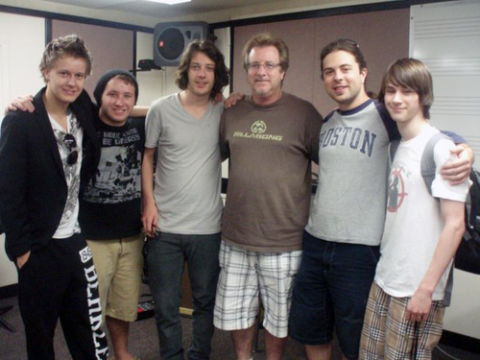Obituary: T Lavitz

T Lavitz with Summer Rock Workshop students in 2009
When working with young musicians, T Lavitz had only one fault: He made a lousy judge. Participating in Daddy's Junky Music Battle for Berklee competitions, "He found it difficult to rate any musician over another," said Dana Acker, Berklee director of special programs. "He only saw good in every single young musician he heard."
Lavitz, a keyboard player who directed Berklee's Summer Rock Workshop, passed away in his sleep the night of October 7. He was 54 years old.
Born in New Jersey, Lavitz got his big break at the age of 22 when he joined the Dixie Dregs, an instrumental progressive fusion band. The band racked up four consecutive Grammy nominations in five years, and Keyboard magazine's readers voted Lavitz Best New Talent.
Berklee faculty guitarist Julien Kasper first saw Lavitz perform at this time. "Seeing them in person completely altered my perspective on the possibilities afforded a rock band with such an incredible level of collective virtuosity," he said. "The experience changed my musical direction." He even went on to attend the same college as Lavitz—the University of Miami.
After the Dregs broke up in 1983, Lavitz recorded and performed with acts including Widespread Panic, Jefferson Starship, Billy Cobham, Nils Lofgren, and Pat Benatar, as well as releasing his own albums with associates such as bassist Jeff Berlin and former Dregs Steve Morse and Mark O'Connor. He cofounded the band Jazz Is Dead to explore and reinvent songs by the Grateful Dead; a reviewer for JamBase praised Lavitz's ability to combine an "absolutely infectious groove" with a "simple, straightforward, yet extremely complex understanding of 'less is more.'"
The Dregs's reunion albums in the '90s brought Lavitz recognition from Keyboard once again, and two more Grammy nominations. The Dregs toured annually throughout the '00s. In 2008, he published the Hal Leonard instructional book Jazz-Rock Keyboard.
Even as Lavitz continued to pound the pavement/ivories, he was making a place for himself at Berklee. In 2006, he began teaching in the college's Five-Week Summer Performance Program. "He was hired because of his strong interest in teaching young musicians, his brilliant career as a performer, and the many supportive recommendations from Berklee faculty and president Roger Brown," said Bob Doezema, associate director of the program. The following year, the college brought him back as artistic director of the new Summer Rock Workshop, a five-week experience for top aspiring rock musicians.
"T shined in this role," said ensemble professor John Pierce. "He had an extraordinary rapport with young students, bringing together diverse groups of talented young people and helping them to work together to make great music in a remarkably short time."
Andrew Riezebeek was one of those students. Participating in the Rock Workshop "resulted in me becoming close friends with T. Lavitz," he wrote in a Berklee blog entry. The intensity of the workshop "helped us create a great social bond. I would have never dreamt to connect with such a successful musician."
But Lavitz loved the college all year round. He was involved in various outreach activities for the summer program, including the Center for Arts in Natick's Rock Off Main Street series and the Daddy's battles.
"Berklee is great, not only because of the kids and the program, but because they really embrace their faculty going on tour," he told Keyboard in 2008. "Can you imagine that? A job that lets you go on the road? It's a great place. There's an amazing amount of young talent there . . . the atmosphere is electric." Appropriately enough, he titled his 2008 album School of the Arts.
"His energy, enthusiasm, and love of music and teaching were inspiring to all who came in contact with him. He will be sorely missed," said Pierce.
